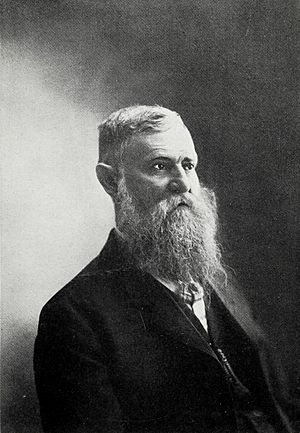Oliver Cromwell Applegate facts for kids
Oliver Cromwell Applegate (born June 11, 1845 – died October 11, 1938) was an important American figure from Oregon. He was a politician, a newspaper editor, and an Indian agent. His family was famous for helping to create the Applegate Trail, a path used by pioneers heading west. Oliver grew up in Southern Oregon. He later worked with the Klamath Tribes on their reservation. He also served as a scout during the Modoc War. Later, he became an Indian agent for all of Oregon. He was also the editor of newspapers like the Ashland Tidings and the Klamath Republican.
Contents
Early Life and Education
Oliver Applegate was born in a log cabin on June 11, 1845. This was in what is now Polk County, Oregon. At that time, the area was called the Oregon Country. His father, Lindsay Applegate, was a well-known pioneer. His mother was Elizabeth Applegate. Lindsay Applegate was a leader in the Great Migration of 1843. This was a big movement of people that helped make Oregon part of the United States.
When Oliver was five, his family moved to the Yoncalla Valley in western Oregon. There were only a few other families living there then. Schools were not very common back then. They often only ran for a few weeks or months each year. However, the Applegate family had many books. This helped Oliver and his siblings learn a lot. They also became skilled horse riders and good with rifles. These skills were important for life on the frontier.
In 1860, his family moved near the Siskiyou Mountains. His father owned a toll road there. In 1862, they moved to Ashland, Oregon. This town became their family home for many years.
Early Career and Military Service
In the winter of 1862, Oliver went to school in Ashland. The next spring, he earned a teaching certificate. That fall, he became a teacher himself. He taught at the Ashland school for four winters.
In the spring of 1863, Oliver joined a special military group. It was a cavalry company called the "Mountain Rangers." This was the only group of its kind in Southern Oregon. Many important citizens were part of it. Oliver started as a private. The next year, he became a sergeant. In his third year, he was chosen as captain. He received these ranks before he was even 20 years old.
Working with Native American Tribes
In 1865, Oliver's father became the United States Indian Agent for the Klamath and Modoc tribes. This was at Fort Klamath. A treaty from 1864 said that these tribes would live on the Klamath Reservation. Oliver Applegate became his father's assistant. This was the start of many years of service. He gained a lot of trust and influence with the tribes in southeastern Oregon. This trust was very important later on.
When Oliver was 21, he led a unique group of scouts. It was called the "Ax and Rifle Company." Each man carried both an ax and a rifle. This company had 50 men. Oliver was the only white man. Different tribal chiefs were lieutenants and sergeants. They helped clear a path through the pine forests. This path was for a large wagon train carrying food and cattle to the Klamath agency. This was a big step in helping the tribes under the 1864 treaty. This happened during a war with the Paiute Indians.
Before the Modoc War began in 1872, Oliver was in charge of the Yainax sub-agency. This was 40 miles from the main agency. The main group of Modocs lived near Yainax. Their leader was Chief Schonchin. The Modoc chief, Captain Jack, was supposed to live there too. But Captain Jack and his group refused to move onto the reservation. This led to the Modoc War. Oliver Applegate played a key role in this conflict.
In 1876, some of Oliver's friends wanted him to become the main Indian agent for all of Oregon. They believed his experience would help improve conditions at agencies across the state. In 1898, Oliver took charge of the Klamath Reservation again. He served as the United States Indian agent for five years. After that, Congress ended the agent position. He then became the superintendent of the agency and training school. He resigned after two years in this role.
During these seven years, he helped Native Americans claim over half a million dollars. This money was for lands that were wrongly left out of the reservation. He also created plans for irrigation and drainage. These plans helped make the reservation much wealthier. The reservation was about the size of the state of Delaware.
Later Years and Family Life
Oliver Applegate also worked as a newspaper editor. He edited the Ashland Tidings starting in 1878. Later, he edited the Klamath Republican.
In 1878, Oliver married Ella Anderson. She was the daughter of a pioneer Methodist minister. Oliver and Ella had six children: Frank Lindsay, Annie Elizabeth, Laroy Gilbert, Rachel Emma, Jennie Margaret, and Oliver C., Jr.
In 1912, Oliver Applegate lived in Klamath Falls, Oregon. He was a member of the Republican political party. He was even a delegate to the 1892 Republican National Convention in Chicago. Oliver C. Applegate passed away on October 11, 1938, at 93 years old. A mountain in Crater Lake National Park, Applegate Peak, is named after him.
 | Valerie Thomas |
 | Frederick McKinley Jones |
 | George Edward Alcorn Jr. |
 | Thomas Mensah |


